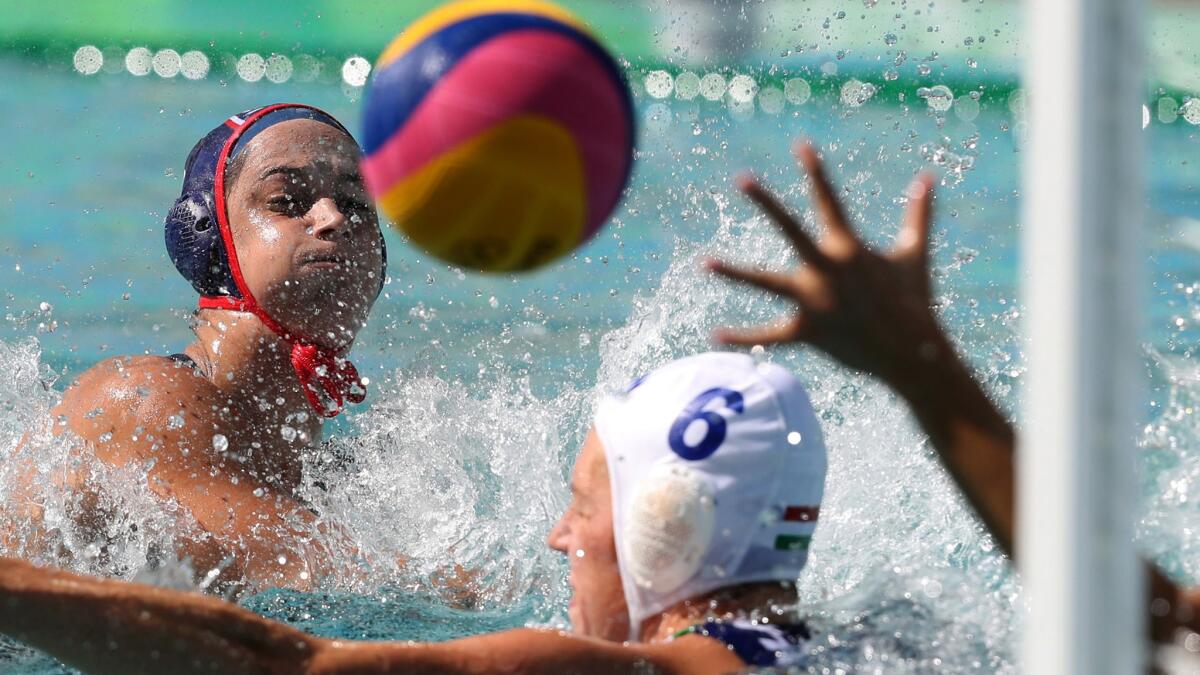Young U.S. women’s water polo team aims to write its own history

- Share via
Reporting from Rio de Janeiro — Aria Fischer says her earliest memories of Olympic water polo date back just four years, to when she watched the U.S. women win their first-ever gold medal in the London Games.
For Brenda Villa and Heather Petri, who pioneered the sport and played in the semifinals of four Olympic Games before winning a title, that game ended a quest that began when Fischer was still in diapers.
Villa and Petri are gone now, having retired as champions. And the players who have replaced them said their goal in the Rio Games is to write a new history by becoming the first team to repeat as Olympic champion.
They got a good start on that by cruising through preliminary round play unbeaten, blitzing Hungary, 11-6, Saturday behind four goals from Maggie Steffens, one of four holdovers from the London team. The U.S. begins play in the quarterfinals Monday when it meets Brazil at the Olympic Aquatics Stadium.
“We definitely look up to them. But we’re our own team,” said Fischer, a 17-year-old Laguna Beach High student who is one of three Orange County teenagers on the team and the first high school student to play for the United States in Olympic water polo. “We don’t compare ourselves to anybody. We’re going to our expectations.”
Coach Adam Krikorian said those expectations haven’t changed despite the fact there are nine first-time Olympians on a Rio roster that averages 23 years old.
“This group hasn’t been through as much,” he said. “But that doesn’t take away from their hunger and their desire to want to be the best.”
Despite its youth, the U.S. team came to Rio with an impressive resume that includes a No. 1 world ranking and victories in every major international tournament since 2014. Krikorian credits that success to an integrated program in which players moving up the ladder of youth national teams are imbued with the same philosophies and style of play.
Moreover, by the time they reach the national team many players have already played with one another in international age-group tournaments, which also helps straighten out the learning curve.
“We have some cohesion,” he said. “And that makes it more of a seamless transition. We don’t want to rebuild, just reload.”
The U.S. has certainly played seamlessly in Rio, joining Italy as one of two teams still perfect through three games. But the top-seeded Americans have also scored the most goals (34) and given up the fewest (14) while running their season record to 37-2 and their winning streak to 18 games.
They’re likely to pad those totals against Brazil, which is winless and has a goal differential of minus-20 after group play.
Leading the way is Steffens, who was MVP of the 2012 Olympic tournament at 19. Now a seasoned 23-year-old, she’s the team’s captain and unquestioned leader. But she says in difficult times, she sometimes channels Villa, Petri and some of the other women she played with.
“Even now, to this day, they’re not even around me and I’m learning from them,” said Steffens, whose four goals Saturday gave her a tournament-high 10. “I’m thinking what would Brenda have done? You learn from the past and I cherish that.
“But now we have new leaders on this team.”
Leaders who want to take the team right back to where it started this journey: on the top of the medal podium at the Olympic Games.
“Bottom line is, you have the most fun when you play well,” Krikorian said. “We don’t want to go out there and not have fun, right? It’s really that simple.
“Good play equals fun, equals smiles, equals laughs, equals a happy coach.”
kevin.baxter@latimes.com
Twitter: @kbaxter11
More to Read
Go beyond the scoreboard
Get the latest on L.A.'s teams in the daily Sports Report newsletter.
You may occasionally receive promotional content from the Los Angeles Times.








